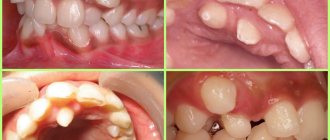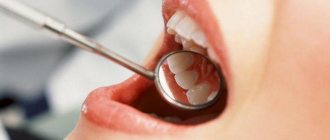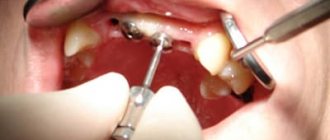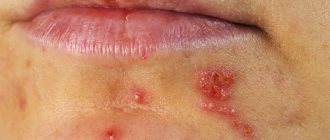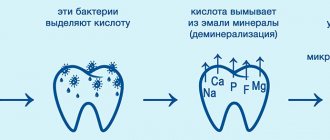A fairly common problem in medical practice is bitterness in the mouth and dry mucous membranes.
This condition appears as a result of many factors and can often indicate the development of a pathological process.
To begin treatment, you need to know why such a sign appears, only in this way will the therapy be effective.
Why is my mouth dry?
If, in addition to bitterness, you also feel dry in your mouth, this symptom may have causes such as diabetes, dehydration, atrophy of the salivary glands or food intoxication, the treatment tactics for which are completely different. Any attempts to get rid of dryness and strong bitterness through more careful hygiene or all kinds of mouth rinses in the morning will only give a short-term effect, but will not solve the problem at the root.
You can influence the cause of an unpleasant symptom only by finding out what caused it. Additional studies - ultrasound, endoscopy - will show a detailed picture of the disease and help clarify the diagnosis.
Why does it happen after sleep?
If bitterness in the mouth appears only in the morning after sleep, its causes may be:
- GERD is gastroesophageal reflux disease, a chronically recurrent pathology that occurs as a result of systematic reflux of contents from the stomach or duodenum into the lower esophagus;
- cholecystitis - inflammation of the gallbladder;
- hepatitis - inflammation of the liver of viral or non-viral origin;
- hepatic steatosis – fatty liver;
- Cirrhosis is an irreversible replacement of the liver parenchyma with connective (fibrous) tissue.
Less threatening causes may be dental problems and poor diet. Sometimes orthodontic materials used in dental prosthetics can cause a bitter taste in the mouth in the morning.
Prevention
To prevent the appearance of an unpleasant taste in the mouth, you should adhere to the rules of a healthy diet, promptly eliminate all diseases and observe the rules of oral hygiene.
https://youtube.com/watch?v=3zTZz-M5SRc
Waking up in the morning, your man began to complain of an unpleasant taste in his mouth. At the same time, the faithful believes that the reason for this is.
Ask a man about what kind of taste bothers him - bitter, sour, sweet? This will make it easier for you to figure out which specialist to contact.
If a nasty taste in the mouth is a one-time phenomenon: it arose once and never returned, then your man is most likely right. The culprit of the trouble is a hearty dinner, which did not have time to be digested overnight and made itself known the next morning. However, if the sore throat bothers your loved one with a certain frequency, this is an alarming sign. There is a high probability that the taste is the first symptom that problems are beginning in the body. They can be either minor, not requiring complex correction, or quite serious, capable of leading to serious complications.
Diagnosis of the disease
You should not independently determine the source of poor health and acute bitterness in the mouth after sleep.
When the first symptoms appear, and especially if there are auxiliary signs, you must contact a clinic or other medical institution. Self-medication is fraught with complications, advanced disease and possible death.
The correct diagnosis is made by qualified medical personnel. He begins to treat the patient after clinical examinations.
Types of bleeding
Bleeding from the mouth can be external or internal. The first is soft tissue damage, mainly related to dental problems. The second is the appearance of blood due to damage to internal organs. Isolation is also possible in chronic respiratory diseases.
Depending on the nature of the bleeding, its causes are judged. It could be:
- pink saliva;
- brown mucus after sleeping in the morning;
- bright scarlet blood that appears at any time of the day;
- taste of blood in the mouth or on the pillow after waking up in the morning;
- the appearance of blood clots, which can be bright red to reddish-purple in color.
The discharge can be clear, mixed with cough and vomit.
Other diseases and conditions
With poor oral hygiene or dental diseases - periodontal disease, gingivitis, dental abscess - a bitter taste may appear in the mouth. Contact your dentist if you have bleeding gums, loose teeth, or aching pain. And if bitterness appears a few hours after installing the filling, then perhaps this is a reaction to the filling material and you will need to reinstall the filling again.
Certain hormonal changes may be accompanied by bitterness in the mouth. This is a common occurrence during pregnancy and menopause. This is also one of the symptoms of heavy metal poisoning: lead, mercury, copper. If you break a mercury thermometer or have other contact with heavy metals, see a doctor immediately. The toxic effects of these substances on the body cause serious health consequences and can even cause death.
We invite you to read the Truth and Myths about Herpes
Many people have noticed a bitter taste in their mouth at one time or another. This symptom manifests itself especially often after 40-50 years, when diseases accumulate in a chronic form.
If the occurrence is associated with taking medications, alcohol or fatty foods, there is no good reason to consult a doctor. It is enough to exclude the use of substances harmful to the body.
But if this symptom appears every day on an empty stomach or in the morning, to maintain health it is necessary to determine its origin.
Warning symptoms
In itself, an unreasonable change in the color of saliva to brown is already a very alarming sign that requires seeing a doctor. But if such a symptom is accompanied by obvious health problems, you should go to the clinic as soon as possible or even call an ambulance. In particular, this must be done when:
- Nausea that gets worse. Bloody vomiting may occur.
- High body temperature.
- Severe weakness, dizziness, disturbances of consciousness.
- The appearance of tarry (black) stools.
Of course, you should definitely consult a doctor as soon as possible if brown saliva is observed in a child, pregnant woman or elderly person.
Medication
Taking pills for bitterness in the mouth in the morning is not enough. The doctor prescribes comprehensive therapy for the underlying pathology, including surgery. What can you take for bitterness in the mouth that occurs in the morning:
- antacids (Rennie, Gastal), proton pump inhibitors (Omez, Pantoprazole) for gastric pathologies;
- eubiotics (Hilak, Bifidumbacterin) for the treatment of dysbacteriosis, food poisoning, intoxication;
- hepatoprotectors (Karsil, Essentiale) for liver diseases.
If bitterness in the mouth in the morning occurs for natural reasons, then it is advisable to use Mint tablets or fresheners in the form of sprays.
In most cases, the pathological background of bitterness in the mouth is associated with gastrointestinal diseases, which means the need for an integrated approach to treatment:
- dieting - excluding fatty, fried, salty, canned foods and alcohol from the diet;
- fractional meals according to the regime, refusal to overeat;
- refusal also from fasting and strict diets;
- limiting the consumption of coffee, strong tea, carbonated drinks;
- body weight control;
- getting rid of nicotine addiction;
- physical activity (to normalize metabolic processes);
- taking medications prescribed by a doctor.
Medicines are selected by the doctor in accordance with the disease that caused the bitterness in the mouth in the morning.
Traditional methods for eliminating bitterness in the mouth
Flax seed. The infusion, reminiscent of jelly in consistency, helps eliminate malfunctions of the stomach and the entire digestive system, having an enveloping effect. Particularly effective for bitterness that occurs after eating. Pound a tablespoon of seeds in a mortar, pour a glass of boiling water, cover with a lid and let it brew for at least an hour. Drink a glass of jelly per day in several doses. The course of treatment is 7-8 days.
Calendula flowers. 10 grams of dry raw materials are brewed with a glass of boiling water and left for 10 minutes. Drink instead of tea at least 3 times a day. An infusion of chamomile inflorescences is prepared in a similar way, which calms the nervous system and has an anti-inflammatory effect. If desired, the drink can be sweetened with natural honey.
Corn silk. They have a choleretic effect, eliminating bile stagnation, and normalize metabolic processes in the body. A tablespoon of dry raw materials is poured with a glass of boiling water and left for at least 2 hours. The filtered drink is consumed 4 times a day, 50 ml. Every day you need to prepare a fresh portion of the infusion.
Marigold. 3 dried or fresh flowers of the plant are brewed in a teapot in 300 ml of boiling water, left for a quarter of an hour and taken 1 glass in the morning on an empty stomach and before bedtime.
Homemade oil. Cold-pressed (unrefined) sunflower oil helps eliminate bitterness in the mouth and improve overall well-being. At the first signs of discomfort, a teaspoon of oil is dissolved in the mouth without swallowing for 10 minutes, after which the white foam is spat out and the oral cavity is rinsed with a slightly pink solution of potassium permanganate.
We suggest you familiarize yourself with Tongue numbness: causes, associated symptoms, treatment
Spices. By chewing cloves or cinnamon sticks, you neutralize the taste of bitterness and cleanse the oral cavity of germs and bacteria.
Freshly squeezed root and green juices of parsley and celery, potatoes, lemon, lime, tangerine. These drinks cleanse the body, increase the secretory functions of the stomach and salivation. It is undesirable to consume sour juices with high acidity.
Liver cleansing. Taking sorbents, for example, enterosgel, activated carbon, fiber-based preparations, crushed milk thistle fruits helps reduce the toxic load on the liver. There are many methods for cleansing the liver, but it is advisable to carry out this activity only under the supervision of a doctor.
Bitterness in the mouth is a symptom of trouble in the body. If measures are not taken to treat underlying diseases, they can become chronic. Timely examination will help avoid the formation of gallstones, the development of chronic cholecystitis, pancreatitis, hepatitis, and liver steatosis. Be healthy!
How to determine the degree of viscosity of saliva?
Most often, a person notes that saliva has become too viscous, based on subjective sensations. This can only be determined accurately in laboratory conditions.
In laboratory conditions, a special device is used to carry out this procedure - a viscometer. At home, you can determine how viscous a person’s saliva is using a micropipette (1 ml):
- draw 1 ml of water into the pipette, holding it vertically, record the volume of liquid that flows out in 10 seconds, repeat the experiment three times;
- sum up the volume of leaked water and divide it by 3 - you get the average volume of water;
- do a similar procedure with salivary fluid (you need to collect saliva in the morning on an empty stomach);
- sum up the volume of leaked water and divide it by 3 - you get the average volume of saliva;
- The ratio of the average volume of water to the average volume of saliva is an indicator of how viscous the consistency of saliva is.
Gastrointestinal pathologies
- Gastritis. In this case, in addition to dry mucous membranes, the patient has stomach pain, vomiting, loose stools, dizziness, and the tongue is covered with a white coating. Quite often, with diseases of the gastrointestinal tract, dehydration and the release of acid from the stomach into the esophagus are observed, which can cause bitterness and dryness in the oral cavity.
- Pancreatitis. This is an inflammatory process in the pancreas. The disease is accompanied by dry mouth, pain in the abdomen on the left side, nausea and belching, and flatulence. In its acute form, the disease begins with an attack of severe pain, but it happens that the pathology develops unnoticed by the patient and gradually becomes chronic.
- Cholecystitis. A disease of the gallbladder and liver, in which there is a failure in their cleansing function. Bile and breakdown products are released into the blood, they are distributed throughout the body, including the salivary glands, which causes bitterness and dryness.
- If biliary dyskinesia is observed, the bile thickens, which leads to stone formation. The patient may complain not only of bitterness in the mouth, but also of severe pain under the ribs on the right.
- Pyelonephritis. An inflammatory process in the kidneys that disrupts the function of the paired organs; the patient suffers from dull lumbar pain, constant thirst, unpleasant taste in the mouth and dry mucous membranes.
Reference! Diseases of the gastrointestinal tract are treated by a gastroenterologist.
Gastrointestinal pathology
A nasty taste in the mouth in the morning is characteristic of a number of digestive diseases, such as:
- dyspepsia;
- colitis;
- ulcer;
- gastritis;
- gastroesophageal reflux disease.
The most common causes are reflux disease and dyspepsia. In the first case, the stomach loses its ability to cleanse itself; its contents, gastric juice, enter the esophagus and cause unpleasant taste sensations.
Other symptoms: nausea, chest pain, bloating. With gastric dyspepsia, an excessive amount of hydrochloric acid is formed in this organ, and motility is impaired. Heaviness, discomfort, and fullness appear in the stomach, even after a small amount of food.
The condition worsens under stress, after taking certain medications.
Causes of bitterness
The reasons for this feeling are as follows.
Disorders of the liver, bile, bile ducts. At the same time, the cells of the largest gland in our body produce bile in the required quantities, but due to the pathological state of the bile gland, stagnation of this fluid is observed in it. It enters the esophagus, causing the patient to experience a bitter taste. In this case, a person’s skin may acquire a yellowish tint, and his urine may turn the unnatural color of dark beer. Gastroesophageal reflux disease is manifested by the fact that due to the weakness of the lower esophageal sphincter, the contents of the stomach along with bile enter the esophagus, and from there into the oral cavity. This is accompanied by heartburn, pain in the sternum and behind it. The pain increases if the person takes a horizontal position. With dyspepsia, the stomach may produce an increased amount of hydrochloric acid. A decrease in the amount of digestive enzymes leads to a constant feeling of fullness in the stomach, heartburn, and pain. In the morning, such patients often feel bitter. These symptoms increase significantly due to stress and overwork. Parasitic infestations destroy the mucous membranes of the oral cavity. For example, the entry of Giardia into the gastrointestinal tract leads to the fact that the small intestine begins to become covered with ulcers. Parasites block the normal processes of food digestion and absorption of nutrients, which is why patients experience symptoms of a lack of vitamins and microelements. Such processes may be accompanied by allergic reactions to metabolic products. Oral diseases can cause short-term bitterness due to irritation of the taste buds. In addition, after certain types of dental procedures, additional irritation of the receptors, tongue, gums and teeth occurs
Of no small importance in the etiology of bitterness is an allergic reaction to materials used in dental practice. Hormonal diseases, in particular, disturbances in the normal functioning of the thyroid gland, lead to an unpleasant sensation of bitterness and bile in the throat. These same pathologies lead to stagnation of bile, which additionally affects the condition of the entire digestive tract. Some medications, when taken orally, leave an unpleasant, bitter taste in the mouth.
It goes away after a while. But some medications can have hepatotoxic effects. And with the destruction of liver cells and dyskinesia of the bile ducts, a certain amount of bile may enter the oral cavity. In this case, there may be a bitter taste in the mouth for a long period.
This is the most common classification of reasons why a person has a taste of bile in the mouth.
During early pregnancy
Often, bitterness and nausea in the morning are observed at the beginning of the period of bearing a child. This is a consequence of toxicosis, hormonal changes (estrogen levels change).
If the expectant mother had problems with the liver or gall bladder before pregnancy, the likelihood of such symptoms increases.
We suggest you familiarize yourself with the cause of dry and bitter mouth at night
If, in addition to a bitter taste, there is vomiting in the morning, yellow sclera of the eyes, skin, swelling, see a doctor to rule out serious illnesses.
What disease is this symptom a sign of?
No doctor will make a diagnosis based on only one symptom, because the resulting result will not be accurate. To facilitate the diagnostic search, it is important for the doctor to know what additional symptoms accompany bitterness in the mouth.
| Symptom | Probable disease |
| Dry mouth | Dental diseases, stress, neuroses, mental pathologies, hyperthyroidism, damage to the trigeminal or facial nerve |
| Heartburn | Increased acidity of the stomach - hyperacid gastritis, GERD, peptic ulcer of the stomach, duodenum |
| Nausea, vomiting | Stress, toxicosis, diseases of the digestive system, including the gallbladder and liver, kidney disease |
| Abdominal pain | Gastritis, ulcer, cholecystitis, cholelithiasis, parasitic infections, viral hepatitis (most often A) |
| Temperature and sweating | Inflammatory process in the gastrointestinal tract |
| Brown, yellow saliva | Dental diseases, smoking, taking coloring medications |
| Bitterness occurs after breakfast | Increased acidity of gastric juice, hepatitis, pathologies of the biliary tract. |
When there are no pronounced provoking factors, it is necessary to be examined and find out what disease the bitterness in the oral cavity in the morning is a sign of. The range of such conditions is quite wide:
- dental problems, inflammation of the gums and tongue (stomatitis, gingivitis, glossitis);
- some pathologies of the respiratory system (postnasal drip, tonsillitis, etc.);
- liver and gallbladder diseases;
- indigestion and diseases of the gastrointestinal tract.
Associated symptoms (heaviness in the right hypochondrium, pain in the side, etc.), as well as instrumental studies, will help to establish the exact cause of the appearance of bitterness in the mouth in the morning in order to select an adequate treatment.
Bitterness in the mouth may be accompanied by additional symptoms. If heaviness or pain is felt in the right side, this may indicate liver or gallbladder disease. If bitterness in the mouth is accompanied by nausea, heartburn, and belching, then the cause may be stomach diseases. If the cause is diseases of the oral cavity, then the feeling of bitterness may be accompanied by bad breath.
In the morning, there is a lot of nasty stuff in the throat, spitting
Aloe and Kalanchoe juice are useful in the form of applications. Bulk copying and use of automatic methods is strictly prohibited! Find an independent laboratory closer to you on the Internet. And find out the price. This could be any infection of the gastrointestinal tract. I would like to know which laboratory to go to and what this procedure is called.
It is imperative to sanitize the oral cavity and consult an otolaryngologist and gastroenterologist. So I started looking at my sputum and what color it was! And one day I went to look at my phlegm again! But there is no urine! It turns out I have pilonephritis, a cold in my kidneys! And because of this there was a fever!
And it was a vessel of blood! And so I went to work! I sit and think the tests are good! Tell me what's wrong with me. She suffered from viral pharyngitis.
Go to the laboratory, donate your saliva for analysis and they will immediately give you a diagnosis. If you are scared by brown saliva in the morning when carrying out hygiene procedures, do not rush to despair. If you have brown saliva in the morning, very simple folk recipes for rinsing will help you with treatment.
It is generally accepted that the body loses blood. Bleeding can be both external and internal. Blood can flow both from body tissues damaged for certain reasons, and from natural orifices of the human body.
Healthy people can survive 15% blood loss without serious consequences. Blood from the mouth is a fairly rare phenomenon, and most often its occurrence indicates serious problems with a person’s health.
Blood from the mouth: for gum disease
For bleeding from the mouth to occur, you need really serious reasons. Of course, it does not always mean that something terrible has happened to the body, but only a doctor can determine the real cause, therefore, if a problem such as blood from the mouth occurs, you must immediately seek help. Blood from the mouth indicates the possible occurrence of diseases such as:
- Tuberculosis is an infectious disease that is quite common in the world and is caused by a certain group of mycobacteria. The disease mainly affects the lungs, but sometimes it can affect other organs as well. Tuberculosis poses a great danger in terms of infecting others, as it is transmitted by airborne droplets.
- cancer of various internal organs and tissues. Bleeding can occur in the mucous membranes of the mouth, pharynx, lungs, and stomach.
- gum disease
You should pay attention to the color of the blood coming from the mouth. If it has a dark color, as if it was mixed with coffee, then this may indicate that it is coming from the stomach and, quite possibly, the reason for this is... If the blood is bright red and there are food particles mixed in with it, then this indicates a high probability of a stomach ulcer in a person. Other reasons are less dangerous, but in any case you should not refuse the help of a specialist.
Bleeding from the mouth can occur for various reasons. In some cases, its appearance indicates serious diseases of some internal organs and systems of a person. If bleeding from the mouth occurs, you should not put off seeking qualified help.
Good oral hygiene
Good oral hygiene prevents the accumulation of bacteria and helps relieve discomfort.
Dentists recommend brushing your teeth twice a day, and preferably after every meal. You should brush your teeth for 2-3 minutes, this is enough to ensure that all bacteria and food debris are removed.
It is also important to floss regularly to get rid of food debris between your teeth.
The baking soda solution helps neutralize bacteria that cause bitterness. It is a natural alkaline and reduces the concentration of harmful acids in the mouth. Add 1/4 teaspoon baking soda and 1/2 teaspoon salt to a glass of warm water. Rinse your mouth with the resulting solution until the unpleasant taste disappears, then rinse with clean water.
If the bitterness is caused by heartburn, taking a soda solution orally will help. To do this, add 1/2 teaspoon of baking soda to a glass of water. Drink the solution after every meal to relieve heartburn symptoms.

